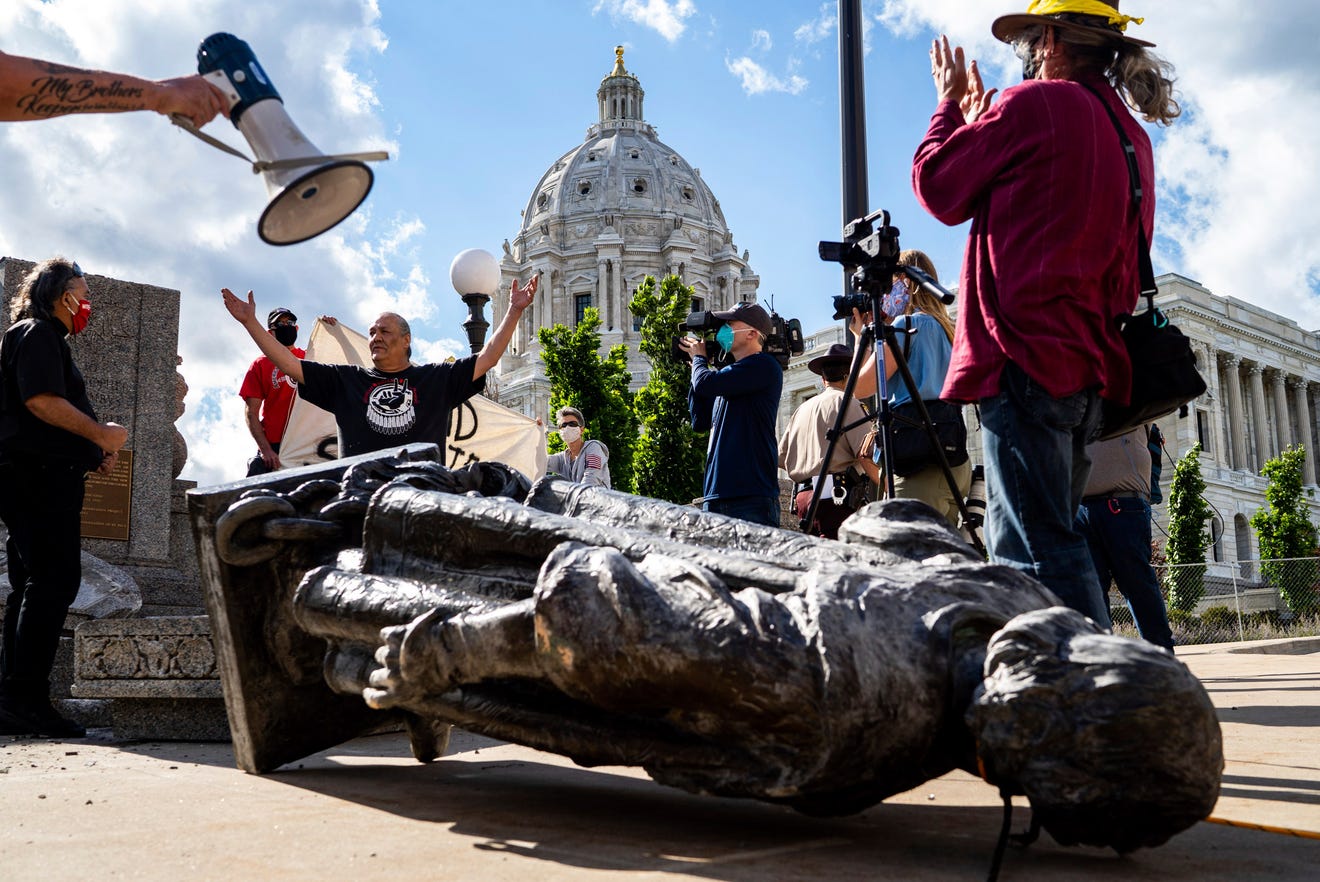
Statue of Christopher Columbus lies on the ground outside the Minnesota state capitol. (AP photo)
In recent weeks, anti-racism and Black Lives Matter protests across the country and around the world have led to incidents of statues of historical figures being dragged off their pedestals or removed by government leaders.
Here in the US, statues commemorating Confederate generals and other monuments to the Confederacy have been targeted by protesters. In England, a statue of the 17th-century slave trader Edward Colston was pulled down and thrown into a river, while Oxford University has recommended that a statue of 19th-century imperialist Cecil Rhodes, for whom the Rhodes Scholarship is named, be removed from its pride of place at the college.
These seem fairly uncontroversial, depending, of course, on your politics and outlook. But other recent cases raise more challenging questions. For example, statues of historic figures with “complicated pasts,” like presidents Ulysses Grant and Theodore Roosevelt, or Christoper Columbus, have also been removed or targeted for removal.
So what’s the right way to approach these questions? What criteria should we use when we think about these very public ways that we venerate figures of the past? David Rupert, writing at the website Patheos, describes the current mood in this way:
It’s a sifting of the past, wiping away any veneration of flawed leaders or unenlightened thinking. We’re rethinking how we talk, how we do business and how we interact with each other.
Some of these changes are formulated out of thoughtful introspection and dialogue. Others are simply mob justice, vengeance against a system for perceived wrongs.
Not all of this is bad, but certainly, not all of it is good.
So that’s where we want to take our conversation this week. What do you see as the meaning and purpose of destroying or otherwise dismantling these statues? Are some of them legitimately fair game, and if so, on what basis? Are other off limits? How would you communicate with someone who sees your answers to these questions differently?
Rupert, in his Patheos piece, as some interesting questions as well. For example, is there an uncomfortable arrogance in presuming that our current view of history is the correct one? Is it our place, or our right, to judge the sins of the past? Here’s how he wraps up his discussion:
Rather than concentrating on the sins of the fathers, maybe we should focus on the sin of the son. That’s you. That’s me.
Join us for the conversation, virtually, tomorrow evening, June 30, beginning at 7pm via Zoom. Links to join tomorrow’s discussion can be found below.
St. Mary’s In-The-Hills is inviting you to a scheduled Zoom meeting.
Topic: Virtual Pub Theology
Time: Jun 30, 2020 07:00 PM Eastern Time (US and Canada)
Join Zoom Meeting
https://zoom.us/j/91411274893?pwd=dnFPRnlCRUxKRkhzbENrREgxNTJhQT09
Meeting ID: 914 1127 4893
Password: 350501
One tap mobile
+19292056099,,91411274893#,,,,0#,,350501# US (New York)
+13017158592,,91411274893#,,,,0#,,350501# US (Germantown)
Dial by your location
+1 929 205 6099 US (New York)
+1 301 715 8592 US (Germantown)
+1 312 626 6799 US (Chicago)
+1 669 900 6833 US (San Jose)
+1 253 215 8782 US (Tacoma)
+1 346 248 7799 US (Houston)
Meeting ID: 914 1127 4893
Password: 350501
Find your local number: https://zoom.us/u/aYCEkGBEA